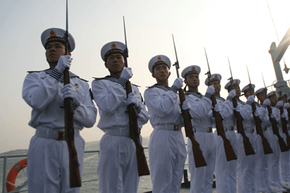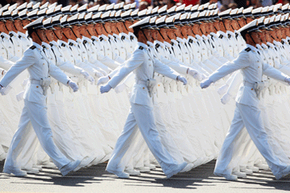Since World War II, only three world powers have been referred to as "superpowers" -- the Soviet Union, the British Empire and the United States. The first two have since lost that distinction, leaving America as the world's only true superpower, according to most history experts. There are no hard and fast rules as to what makes a state a superpower, but there are some defining characteristics that most pundits agree are necessary to earn the title. Being a global leader in economics, culture and education, along with a strong military presence are all hallmarks of a superpower. Japan was believed to have been the next superpower in the 1980s, but that prediction never came to fruition.
China is now generally seen as the next candidate for the superpower distinction, with some actually asserting that China has aims to take over the world. Language like that can make China's intentions seem sinister, and even though some politicians and economists may believe the country is plotting for world domination, what's more likely afoot is that China is in a two-way fight with the United States for the most foreign interests. These interests serve a purpose, but what they all add up to is control of foreign resources and commodities, as well as in a militaristic sense. The old adage "whoever dies with the most toys wins" is a joke, but the idea could apply to the battle being waged between the United States and China. In this case it's not toys, but military bases, trade partners and rights to natural resources in foreign countries. In other words, which country gains or retains the title of superpower.
Advertisement
China has a problem -- its population does not match its resources and gross domestic product. China's more than 1.3 billion people don't have the resources to adequately care for themselves [source: University Nebraska at Omaha]. This has led China to begin exporting its people, in a sense, by setting up shop in other parts of the world. Look no further than Africa, where China has rapidly developed its presence during the last decade, in countries like Nigeria and Angola, among others. During that time, more than 750,000 Chinese have moved to Africa [source: Malone]. Some experts contend that the plan is to increase this number to the hundreds of millions, helping to put a dent into China's natural resource problem by tapping into Africa's resources, while thinning the herd in the home country [source: Malone]. Air and sea routes are increasing between China and African nations as massive deals are made for commodities, trade, labor and military cooperation. Chinese private schools, embassies and cultural centers are popping up in places like Rwanda, Nairobi and Angola. Angola even has its own "Chinatown" district.
In return, countries in Africa get a willing trade partner and assistance and weaponry for its military factions. Africa also receives the supposed benefit of jobs and infrastructure building. While trade has increased from 5 million Yuan to 6 billion in the last 10 years, many contend that Africa is getting the short end of the stick, importing cheap Chinese toys and goods, while exporting valuable commodities like oil and timber. It's estimated that 70 percent of African timber ends up in Chinese ports, a figure that hints at massive deforestation [source: Malone]. There are also assertions that Chinese mining operations in Africa are staffed with African laborers earning less than one Yuan per day, which is about 14 cents [source: Malone]. The weapons sent to Africa often supply arms that help to fuel the continent's many civil wars. And in some parts of Africa, Chinese-only communities have gates, and blacks are not allowed to enter.
Similarly, China has reached out to Latin America as well, bypassing the United States as Brazil's No. 1 trading partner, and coming in second to the United States in Argentina, Costa Rica, Chile, Peru and Venezuela. With this kind of reach, and a population at well over a billion people, it's no wonder that a large percentage of the global financial news focuses on China. But is China poised to become a true superpower?
Advertisement



